Part 1: Resolution 57-NQ/TW – The driving force for reforming the Party's leadership methods.
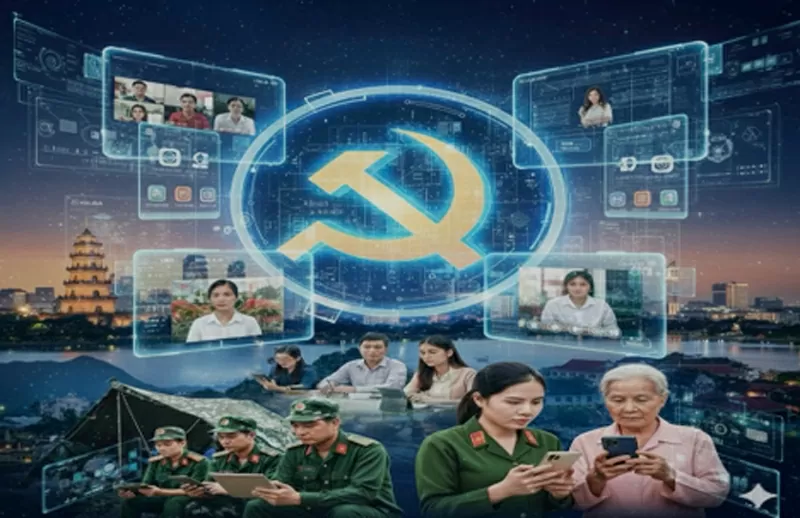 |
| Images created using AI: Applying information technology and new models to improve Party activities and Party member management; New models of Party activities for Party branches and grassroots Party committees in special locations or under special circumstances. |
On December 22, 2024, the Politburo issued Resolution No. 57-NQ/TW on “Breakthroughs in the Development of Science, Technology, Innovation, and National Digital Transformation.” This is a strategic resolution, reflecting the Party's foresight and strong determination to make science and technology the central driving force for national development. In particular, the resolution also opens up new directions for Party building in the context of the Fourth Industrial Revolution and the national digital transformation process. The application of information technology (IT) and the innovation of Party activities have become urgent tasks to improve the effectiveness of leadership and management, and to build a clean, strong, modern, and people-oriented Party.
For many years, our Party has always focused on reforming leadership methods, but these have largely relied on traditional management forms, heavily dependent on paper documents and direct communication. In the context of the rapidly developing digital economy and society, this model reveals certain limitations: information transmission is slow and difficult to control, and supervision and inspection are sometimes not timely or transparent. Therefore, Resolution 57-NQ/TW was issued with a very new content: linking digital transformation with Party building, considering this a breakthrough to enhance the Party's leadership and management capacity, and modernizing the entire operational process from the central to the grassroots level.
The resolution clearly states that the development of science and technology and digital transformation should not only serve production, business, or state management, but also become the foundation for innovation and improving the quality of Party branch activities and Party member management. This creates opportunities for Party branches – the cells of the Party – to become leading nuclei in the national digital transformation process, while helping the Party truly be closer to and accompany the people in the digital age.
Current state of Party branch activities and Party member management: Many challenges remain.
Currently, the country has over 5.3 million Party members, operating in hundreds of thousands of Party branches and grassroots Party committees. This is a powerful political force, playing a core role in the political system. However, the work of Party activities and member management is facing many difficulties, especially in the context of increasingly urgent modernization and digital transformation requirements. Many Party branches operate in remote areas, islands, and border regions, where transportation is difficult and infrastructure is lacking. In private enterprises, industrial zones, or dispersed production units, gathering Party members for regular meetings becomes even more complicated. This leads to Party branch meetings not being held on time, disrupting leadership work and affecting the effectiveness of implementing Party resolutions and policies.
Party member management still relies primarily on manual paper-based records. Searching and compiling information is done manually, which is time-consuming and carries the risk of data inaccuracies. When it comes to compiling statistics or tracking changes in party membership, Party committees often face difficulties and lack accurate databases to support their leadership work. This not only wastes human resources but also affects transparency and timeliness in management, especially when issues arise such as transfers, awards, disciplinary actions, or the review of party member files. A worrying reality is that in many places, branch meetings remain largely 형식적인 (formalistic), failing to foster collective intelligence and democratic discussion. The content of party meetings is often rigid, heavily focused on reporting, lacking connection to reality, and failing to keep up with current events and the fighting spirit in party building work. This reduces their attractiveness, causing a segment of party members, especially young members, to lack genuine interest and fail to fully play their pioneering and exemplary roles.
Guidance from higher-level Party committees down to the grassroots level has not been truly timely. In unexpected situations such as natural disasters, epidemics, or social distancing, Party activities are easily disrupted. Many Party branches cannot hold meetings on schedule, undermining the continuity of leadership and management. Meanwhile, the lack of specialized technological platforms forces many places to use common online tools, posing risks to information security and failing to ensure the legality of Party organization activities.
Innovating the methods of Party activities and member management not only addresses current shortcomings but also contributes to enhancing the effectiveness of Party leadership from the grassroots to the central level, meeting the requirements of building a clean and strong Party in the new era. Through digital transformation, the political system can overcome traditional barriers while maximizing the potential of Party members, affirming the comprehensive leadership role of the Party in the period of integration and development.
Models of applying information technology in Party activities.
Many localities and units have proactively implemented new models, leveraging technology to improve the quality of Party branch activities and Party member management.
The comprehensive digital branch model ensures that each party member has an electronic file linked to a unique identifier, storing their entire work history, training, awards, and disciplinary actions. Branch meetings can be held in person or online, with minutes and resolutions digitally signed and stored using blockchain technology, guaranteeing absolute transparency and security. The system integrates data analysis tools, automatically compiling statistics on meeting attendance rates, the number of opinions expressed, and the quality of voting, giving the Party committee a comprehensive and accurate overview of the branch's activities.
The digital Party branch model not only minimizes manual paperwork, saving time and costs, but also creates a large data repository serving the planning, training, and appointment of cadres. Simultaneously, it strengthens the connection between Party members, Party branches, and higher-level Party committees, ensuring smooth and timely information flow. For Party branches in remote areas, islands, border regions, or where Party members are dispersed, the online or hybrid online-in-person meeting model is proving effective. In this model, secondary meeting points are connected to the main meeting point via a video conferencing system, ensuring that Party members can participate fully regardless of their location. This model is particularly effective in emergency situations such as natural disasters and epidemics, preventing interruptions to Party activities. Successful implementation requires a stable network infrastructure, prioritizing satellite or 5G technology; a specialized meeting platform with high security; and a rigorous identity verification mechanism. Cadres and Party members must also receive training in technological skills to use them proficiently.
The model involves Party branches linked to community digital technology teams. In this model, the Party branch not only provides political leadership but also directly operates and coordinates the digital technology teams in villages and hamlets. Party members play a pioneering role in guiding people to use online public services, electronic payments, and register for digital identity accounts, thereby contributing to promoting digital transformation at the grassroots level. This model both enhances the digital capacity of the community and affirms the Party's leading role in the country's modernization process.
Technological solutions, policy mechanisms, and human resource training.
For these models to be effective, a comprehensive set of solutions needs to be implemented, with a focus on technology, policy mechanisms, and human resources.
In terms of technology, the first step is to build a nationwide database of Party members, interconnected from the central level to the grassroots, and synchronized with the national population database. Each Party member will have a unique identification code, facilitating management and retrieval. This system needs to integrate artificial intelligence (AI) to analyze data, predict trends, and support planning and cadre training. In addition, a specialized, highly secure platform for Party activities needs to be developed, integrating functions such as online voting, digital signatures, automatic minute recording, and electronic document storage. Simultaneously, multi-layered cybersecurity solutions must be developed, with mechanisms for early warning and regular risk assessment and mitigation.
Regarding mechanisms and policies, it is necessary to quickly finalize the legal framework for online activities, clearly defining the legal value of electronic minutes and resolutions, the remote monitoring mechanism, and how to handle arising situations. At the same time, there needs to be a rational investment policy, prioritizing budget allocation for digital infrastructure in specific regions, while encouraging social participation and public-private partnerships in developing technology platforms. The evaluation and rewarding of officials should also be linked to the results of IT application and digital transformation, encouraging officials to boldly propose initiatives.
People are the key factor. It is necessary to strengthen training and development of digital skills for cadres and Party members, especially those in charge of Party work at the grassroots level. Each Party branch should have at least one "digital core" who understands technology and plays a leading role in implementing online activities. Digital transformation content should also be included in political and theoretical training programs for new Party members and prospective cadres. At the same time, a "Party Member Pioneering in Digital Transformation" emulation movement should be launched, linked to annual evaluations, creating motivation for the entire system to move forward together.
Applying information technology to Party work will undoubtedly face many difficulties. The lack of synchronized network infrastructure, especially in mountainous and island areas, is a major obstacle. There are significant disparities in IT skills among localities and groups of Party members. The risk of information leaks and cyberattacks is ever-present without robust security measures. Furthermore, some cadres and Party members still harbor reservations and are not yet ready to change traditional working methods.
To address this, priority should be given to investing in digital infrastructure following the principle of "prioritizing disadvantaged areas," considering this as the fundamental foundation for all activities. Simultaneously, cooperation with technology companies should be strengthened in training, technology transfer, and improving the IT skills of officials. Security must be prioritized, with a multi-layered defense system and rigorous inspection procedures. Alongside this, public awareness campaigns need to be intensified, helping officials and Party members understand the benefits and responsibilities of digital transformation, thereby preparing them for change and proactively adapting.
The application of information technology and the innovation of Party activities are not only an inevitable trend but also an urgent requirement to successfully achieve the goals of Resolution 57-NQ/TW. Digital Party branches, online meetings, and Party member management using big data will contribute to improving leadership efficiency, ensuring democracy, transparency, and modernity. This is a groundbreaking transformation that will help our Party continue to affirm its pioneering role and comprehensive leadership, leading the country to rapid and sustainable development in the digital age.
Digital transformation is not only a tool, but also a driving force for the Party to remain strong and capable of leading in all situations and periods. With high political determination and the synchronized participation of the entire Party and the entire people in applying information technology in Party activities and managing Party members, it will certainly become one of the most important breakthroughs in Party building in the new era.
------
Part 2 - BIDV Bank Party Committee pioneers digital transformation: A model of innovative leadership in the digital age.
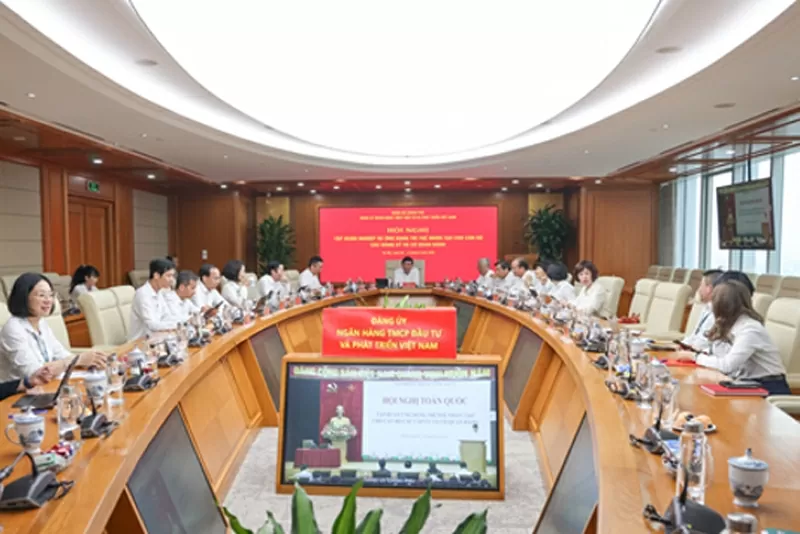 |
| The BIDV Bank Party Committee participated in the training conference on the application of artificial intelligence, a conference that was conducted online by the BIDV Party Committee for all 251 subordinate Party branches/committees. |
In the era of digital technology and the Fourth Industrial Revolution, digital transformation is no longer an option but an inevitable requirement for development. Digital transformation is not limited to production, business, or services but has spread to all aspects of social life, including political activities, state administration, and Party building. The Party and State of Vietnam have identified digital transformation as one of three important strategic breakthroughs aimed at enhancing national governance capacity, modernizing the economy, and building a streamlined and efficient political system. In this context, the Party Committee of the Vietnam Investment and Development Bank (BIDV), one of the leading state-owned commercial banks with 251 subordinate branches/party committees and over 12,300 party members, has affirmed its pioneering role by boldly implementing the construction of a "Digital Party Committee," linked to the goal of comprehensive digital transformation in leadership, management, and operation, while contributing to promoting the national digitalization process.
BIDV: A journey from tradition to digital aspiration
BIDV is a bank with a rich history spanning over 68 years. Throughout this period, BIDV has not only been a crucial financial institution serving the nation's development and defense, but also a cradle for training and nurturing thousands of banking professionals. The BIDV Party Committee has always played a comprehensive leadership role, guiding the bank's development. In recent years, amidst the dramatic changes in the financial market and the explosive growth of digital technology, BIDV has recognized that digitalization is not only a business trend but also an urgent requirement in internal management and, especially, in Party work.
Since 2024, the BIDV Party Committee has launched Phase I of the project to digitize Party work. This phase lays the foundation, focusing on standardizing data systems, building basic technological infrastructure, and raising awareness among cadres and Party members. The positive results of this phase have created confidence and a solid basis for BIDV to move on to Phase II with a higher and more comprehensive goal: a complete digital transformation of Party work, moving towards the formation of a "Digital Party Committee" closely linked to the digitalization process in the bank's professional operations.
On July 30, 2025, the Standing Committee of the BIDV Party Committee issued a Resolution on the digital transformation of Party work for the period 2025-2028, officially launching a new phase of this process. The Resolution clearly states the political determination and strategic vision of the entire Party Committee, stipulating that all leadership, management, and activities of the BIDV Party Committee will be organized and operated on a digital technology platform, aiming for a transparent, modern, efficient, and paperless system.
According to the Resolution, BIDV aims to comprehensively complete its digital infrastructure, digital data, and digital application platforms by 2028, while simultaneously building a team of "digital party members"—officials and party members who not only possess strong political qualities but are also proficient in technology, have innovative thinking, and are ready to operate modern digital systems.
To realize this vision, the BIDV Party Committee will focus on three main pillars. The first pillar is building a modern and synchronized technology infrastructure, ensuring the highest level of information security. All 251 branches/party committees under its direct supervision will be equipped with modern technology equipment, and cloud computing infrastructure will be deployed to meet the requirements for high-speed connectivity and multi-platform integration.
The second pillar is the standardization and digitization of Party work data. All data related to organizational structure, Party member records, propaganda work, inspection and supervision, mass mobilization work, directive documents, etc., will be digitized, stored, and managed centrally. Non-confidential documents will be digitally signed and processed entirely in a digital environment, progressing to include confidential documents according to the roadmap and directives from higher levels. This will not only save time and costs but also enhance transparency and security in management.
The third pillar is the development of smart application platforms. The BIDV Party Committee will build a system for managing Party members, branch activities, online meetings, and Party work on a digital platform, aiming to completely eliminate manual paperwork and record-keeping. In particular, BIDV is researching the application of artificial intelligence (AI), big data, and blockchain to support analysis, forecasting, and improve the efficiency of leadership and management. This is a bold step, affirming BIDV's determination to not only catch up but also lead the digital transformation trend in the political system and the banking industry.
To ensure the synchronized and effective implementation of digital transformation, the Standing Committee of the BIDV Party Committee established the Task Force for Digital Transformation of Party and Mass Organization Work, Phase II. This task force comprises core members from the Party Committee Office, the Party Committee's Organization Department, the Party Committee's Inspection Committee, the Party Committee's Propaganda Department, the Trade Union, and the Youth Union. This task force plays a role in advising, supervising, and coordinating all digitalization activities on the B.One internal management platform, a system specifically designed by BIDV to integrate Party and mass organization work and professional activities into a unified platform. B.One is not only management software but also a digital ecosystem connecting data between units, ensuring that all information is shared seamlessly, accurately, and securely. As a result, Party committees and organizations at all levels can easily grasp the situation, make quick and effective decisions, and minimize errors while saving resources.
One of the key breakthroughs in BIDV's digital transformation plan is the comprehensive digitization of inspection and supervision work. On August 18, 2025, the Standing Committee of the BIDV Party Committee issued Resolution No. 17-NQ/DU on strengthening the digital transformation of inspection, supervision, and prevention of internal corruption within the BIDV Party Committee for the period 2025-2030. The BIDV Party Committee will apply digital technology to build an intelligent monitoring system, aiming for the motto "monitoring based on data, inspecting based on data." This helps to detect early signs of violations, thereby proactively preventing and stopping corruption at its root. According to the Resolution, by 2026, all Party committees and subordinate Party organizations must seriously implement regulations on inspection and supervision work in conjunction with digital transformation. A centralized data system will be built, fully integrating information on Party organizations, disciplinary records, complaints and denunciations, inspection and supervision results, etc. At the same time, at least 90% of inspection staff will receive training in information technology, digitalization skills, and data security. By 2030, the entire inspection and supervision process will operate in a digital environment. Thematic inspections will be based on big data analysis, helping to detect early signs of irregularities. This is a crucial step, moving inspection and supervision from traditional methods to modern, transparent, and effective practices, while contributing to the control and prevention of corruption and negative phenomena.
A bright spot in digital transformation efforts.
As of July 31, 2025, BIDV's Party and Mass Organizations Division has achieved 75% of its work files processed and stored digitally, marking a significant step forward in reducing paperwork and modernizing management methods. Only about 25% of files remain in paper form, primarily due to the specific nature of the work and legal requirements. These files relate to the recruitment and management of Party members, internal political security, confidential documents, minutes of Party committee meetings, trade union and youth union finances, as well as procedures for soliciting opinions, awarding commendations, and disciplining personnel within the system.
Maintaining a portion of paper records is necessary to meet procedures and regulations, while also ensuring confidentiality, especially for politically, personnel, and organizationally sensitive documents. The above results demonstrate the strong efforts of the BIDV Party Committee in implementing a comprehensive digital transformation policy. To achieve the current 75% rate, the BIDV Party Committee has accelerated the deployment of the B.One internal management platform, enabling the digitization of party member management processes, document processing, and real-time work monitoring. This is a comprehensive digital ecosystem connecting Party committees, branches, and mass organizations throughout the system, helping to minimize time and costs and enhance transparency and efficiency in leadership and management. Although a high rate has been achieved, many challenges remain in increasing the rate of digital document processing. Certain specialized tasks, such as union finances, internal political security, or confidential documents, still require paper copies to be stored.
BIDV recognizes that technology is merely a tool, while people are the decisive factor in the success of digital transformation. Therefore, the BIDV Trade Union launched the "Nationwide Emulation Movement for Innovation and Digital Transformation," combined with the "Digital Literacy Program" to popularize digital skills among all staff, employees, and union members. This movement quickly spread, creating a vibrant competitive atmosphere throughout the system. Online classes on artificial intelligence, digital skills, and information security were regularly organized. Activities such as "AI Learning Week," "One Digital Lesson for Every Employee," and competitions like "Digital Innovation Ideas" and "Hack the Idea" attracted widespread participation from staff. As a result, the digital awareness and skills of BIDV's workforce have significantly improved, fostering a top-down digital culture. Besides disseminating knowledge, the movement also encourages units to propose new initiatives and models in professional and trade union work. Outstanding initiatives are not only widely applied but also promptly honored and rewarded, creating a strong impetus for the innovation movement.
A key aspect of BIDV's development strategy is the harmonious combination of digital transformation and green transformation. BIDV not only digitizes processes and data but also aims to green its internal operations, minimizing environmental impact. In its Resolution on Green Transformation, BIDV commits to becoming a pioneering bank in green finance, accompanying customers and the community in the transition to a low-carbon economy. BIDV aims for strong growth in green credit outstanding, developing sustainable financial products, and implementing emission reduction measures in its internal operations. Setting a target of 85% of work documents being processed and stored digitally by 2025 not only enhances operational efficiency but also contributes to reducing paper usage and saving natural resources. This demonstrates a comprehensive approach combining digitalization and sustainable development.
Digital transformation within a large-scale Party organization like BIDV, with over 12,300 Party members and 251 subordinate Party branches/committees, is an extremely challenging task. The limited technological skills and awareness of some staff members, coupled with increasingly stringent information security requirements, present significant challenges. Furthermore, shifting from traditional to digital working methods demands perseverance, determination, and strong consensus. Some staff members are hesitant to embrace change, while the sheer volume of digital transformation work requires substantial resources in terms of personnel, finance, and technology. The BIDV Party Committee has clearly demonstrated its political resolve and strategic vision. Resolution 91-NQ/DU, issued on May 12, 2025, identified science and technology, innovation, and digital transformation as key drivers for BIDV's development until 2030 and its vision until 2045: "BIDV will become a comprehensive digital financial institution, integrating banking and technology, leading Southeast Asia in financial innovation, data capabilities, and customer experience, playing a central role in the national digital financial ecosystem." Accordingly, BIDV continuously invests in upgrading its modern digital infrastructure, building a high-quality workforce, and promoting cooperation with domestic and international technology partners. More importantly, BIDV has fostered a spirit of innovation and a desire to contribute in each employee and Party member. When each individual clearly understands their role, difficulties become motivation, and challenges are transformed into opportunities for advancement.
The digital transformation of Party work at BIDV not only serves the bank's internal needs but also directly contributes to the national goals of digital government, digital economy, and digital society. With a vision to 2045, BIDV strives to become a comprehensive digital bank, playing a central role in the national digital financial ecosystem, and serving as a pioneering model of a modern, innovative, and efficient Party organization. The journey of building a "Digital Party Committee" at BIDV is a testament to the combination of technological innovation and political innovation. This is not just a process of digitizing data, systems, or processes, but more profoundly, a digitization of trust, unity, and the aspiration for development.
A long-time employee at BIDV shared: “We are not only digitizing our work, but also our beliefs and responsibilities. The digital Party Committee will be the foundation for BIDV to move forward confidently in the digital age, while making practical contributions to the prosperity of the country.”
With strategic vision, decisive action, and the concerted efforts of the entire system, BIDV is affirming its pioneering position in the digital transformation of the banking system and Party organizations. BIDV's success is not only a source of pride for the finance and banking sector, but also a model for Party organizations, businesses, and agencies nationwide to learn from, working together to build a modern, prosperous, and sustainable digital Vietnam.
| Authors: Vo Thanh Phuong; Doan Nguyet Nga – BIDV Party Committee Organization Department |
Source: https://baoquocte.vn/doi-moi-sinh-hoat-quan-ly-dang-vien-bang-cong-nghe-va-mo-hinh-moi-dang-bo-ngan-hang-bidv-tien-phong-trong-chuyen-doi-so-332606.html


![[Photo] Prime Minister Pham Minh Chinh receives the Governor of Tochigi Province (Japan)](/_next/image?url=https%3A%2F%2Fvphoto.vietnam.vn%2Fthumb%2F1200x675%2Fvietnam%2Fresource%2FIMAGE%2F2025%2F12%2F16%2F1765892133176_dsc-8082-6425-jpg.webp&w=3840&q=75)

![[Image] Leaked images ahead of the 2025 Community Action Awards gala.](/_next/image?url=https%3A%2F%2Fvphoto.vietnam.vn%2Fthumb%2F1200x675%2Fvietnam%2Fresource%2FIMAGE%2F2025%2F12%2F16%2F1765882828720_ndo_br_thiet-ke-chua-co-ten-45-png.webp&w=3840&q=75)
![[Photo] Prime Minister Pham Minh Chinh receives Lao Minister of Education and Sports Thongsalith Mangnormek](/_next/image?url=https%3A%2F%2Fvphoto.vietnam.vn%2Fthumb%2F1200x675%2Fvietnam%2Fresource%2FIMAGE%2F2025%2F12%2F16%2F1765876834721_dsc-7519-jpg.webp&w=3840&q=75)
![[Live] 2025 Community Action Awards Gala](/_next/image?url=https%3A%2F%2Fvphoto.vietnam.vn%2Fthumb%2F1200x675%2Fvietnam%2Fresource%2FIMAGE%2F2025%2F12%2F16%2F1765899631650_ndo_tr_z7334013144784-9f9fe10a6d63584c85aff40f2957c250-jpg.webp&w=3840&q=75)





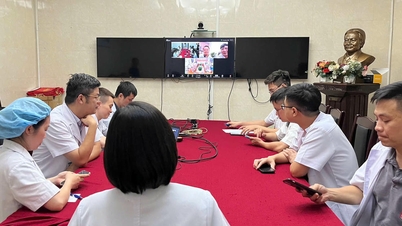


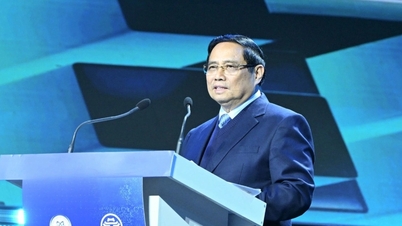

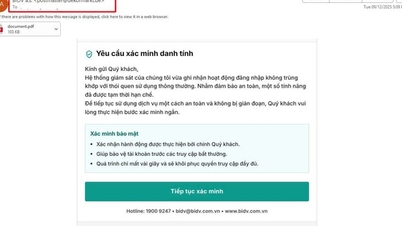





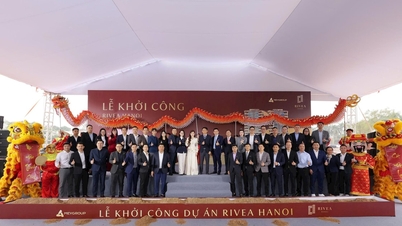

































































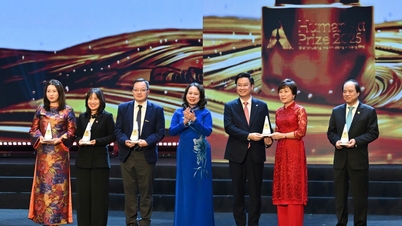























Comment (0)